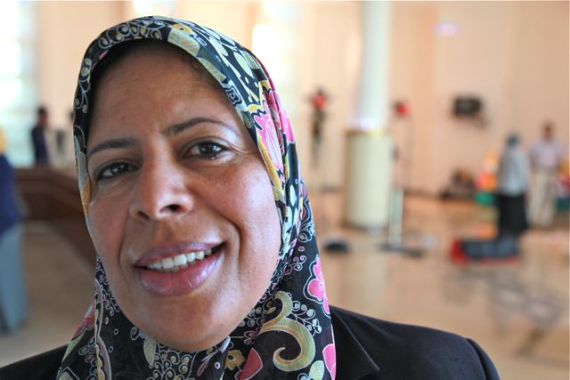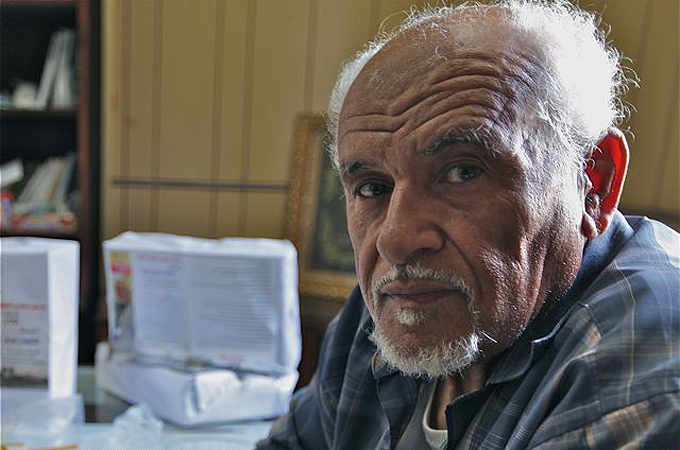Libya election: Benghazi candidate profiles
A look at some of those standing for election in the country’s second city.

Libyans will head to the polls on July 7 to elect a 200-member temporary national assembly that will appoint a prime minister, make laws and help draft a new constitution for the new country they hope to build.
Some 2.7 million people, or 80 per cent of those eligible, have registered to vote in the election, suggesting huge appetite for democracy after 42 years of dictatorship under Muammar Gaddafi.
For the 120 seats reserved for individual candidates, there are exactly 2,500 candidates, amongst whom only 85 are female.
The remaining 80 seats are set aside for the 130 political parties (or political entities, for lack of legislation that defines parties) that have fielded a total of 1,202 candidates, amongst them 540 women and 662 men.
|
Amal Mohamed Bayou – Independent candidate |
Bayou, 54, is one of only 19 female individual candidates running for the July 7 election in the Benghazi district.
 |
| Bayou has mainly relied on her circle of family and friends to spread campaign material [Al Jazeera] |
Before the revolution, she was preparing to finish her PhD in microbiology in Germany after a master’s degree at the science faculty of Benghazi University.
When the fighting broke out, she went back to her home country to be with her family and got involved in post-revolution social work, and more recently promoting female participation in the electoral process.
Bayou is not an active campaigner and has mainly relied on her circle of family and friends to spread campaign material, such as posters and leaflets and via Facebook.
She admits that – as a female candidate without the backing of a major party – it is unlikely she will win a seat in the General National Congress, but says “it feels great” to see her face on a poster in the streets of her hometown.
Her main campaign issues, she says, are human rights, education and creating awareness and trust in Libya’s soon-to-be-created constitution.
“We need to protect this new constitution, otherwise it will be useless. Look at the countries around us, like Egypt, Jordan, Morocco, Tunisia. All these countries have constitutions, and failed. Libya still needs a lot of education on this issue. We need knowledge in order to be able to support and protect the constitution. This education needs to start from a very young age,” she says.
|
Faraj Abdel Aziz Najem – Independent candidate |
Najem, a 48-year-old British-schooled Doctor of Sociology, became persona non grata in Libya after publishing several critical books that were banned by Muammar Gaddafi.
 |
| Like many candidates from Benghazi, Najem is a strong proponent of decentralisation of Tripoli’s power [Al Jazeera] |
He has already been involved in post-revolution politics as an adviser to the National Transitional Council, on areas such as revolutionary martyrs and the political framework in the transitional period.
Like many candidates from Benghazi, Libya’s second city, Najem is a strong proponent of the decentralisation of Tripoli’s power. Benghazi is what he calls “the political compass of Libya” and will only be peaceful if it is given a fair chance economically.
Najem, therefore, campaigns on making his city a hub for commerce and trade, with the eventual goal of winning the label “economic capital of Libya”.
He decided to run as an individual candidate because he is a “solo-man” who does not want to be confined to the perimeters of political parties.
“Benghazi is Libya-minor, meaning that all kinds of Libyans are represented in this city. Others in Libya expect Benghazi to take the lead and since World War I it has. The formation of Libya was done in Benghazi, the formation of the emirate was done in Benghazi and recently, the revolution was born in Benghazi. Therefore, to make Benghazi resting it should be economically viable, an economic hub,” he says.
|
Lamya Fatahi Abu Sidra – Homeland Party [Hizb Al Wattan] |
Abu Sidra, 38, heads the Benghazi list for the Homeland Party, one of Libya’s main political forces. Though it is seen by many as an Islamist party, she strongly rejects this view.
 |
| Abu Sidra never expected to enter politics and actually tried to stay out of it [Al Jazeera] |
Abu Sidra says Al Watan has a “national programme within an Islamic framework” which sits naturally within Libya as an Islamic country.
Born in the United States, raised in Benghazi and British-schooled, Abu Sidra received her PhD in electrical engineering from the UK, but rolled into politics due to her post-revolution work in civil society.
She never expected to enter politics and actually tried to stay out of it, but now sees it as a “duty because of the sacrifices so many people have made” in the revolution.
Abu Sidra was asked by a number of parties to join their list, but chose Al Watan because of its broad political framework, that according to her is trying to “find the Libyan identity”.
At the head of the list of a major party, she will most likely be voted into the 200-seat General National Congress on July 7 and would thus be presiding over the drafting of Libya’s new constitution.
“The 60-member constitutional committee will be drawn 20-20-20 from Libya’s three main geographical regions but the exact process is still being debated. It is clear, however, that the members of the constitutional committee will come from outside the General National Congress, meaning it will not be drafted among the 200 members of congress,” she says.
|
Suliman Zubi – Independent candidate |
Zubi, 69, a retired public prosecutor from Benghazi, runs a small arbitration office around the corner from Benghazi’s Freedom Square, where the uprising against Gaddafi began.
With a master’s degree in law from Washington State University in Seattle, Zubi returned to Libya and was promoted to judge in the court of appeal in 1984.
 |
| Zubi has represented Libya at international courts [Al Jazeera] |
In 1996, he was nominated by the Libyan government as the country’s main representative at the International Court of Arbitration in Paris.
With his legal experience, Zubi says he sees it as his duty to get involved with the process of defining the future shape of the state of Libya.
He says the High National Election Committee has strongly urged him to run for candidacy because he has already been working and promoting his own early proposal for a new national constitution.
His constitutional draft says that all Libyans should be included in choosing the country’s new name and political system.
“Will Libya be called the Islamic Republic of Libya, like the Islamists would want? Or will it be called simply the State of Libya, or the Republic of Libya, or some other name? This is a very contentious issue that needs careful consideration. In my opinion, this should not be decided by the General National Congress but by means of a national referendum,” he says.